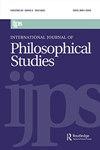斯宾诺莎对上帝的理智之爱
IF 0.6
3区 哲学
0 PHILOSOPHY
INTERNATIONAL JOURNAL OF PHILOSOPHICAL STUDIES
Pub Date : 2022-08-08
DOI:10.1080/09672559.2022.2136734
引用次数: 1
摘要
斯宾诺莎最著名的思想之一是他对上帝的理智之爱。有人认为,这一概念与伦理学的主要原则有些格格不入,特别是因为它让人联想到更正统的宗教与上帝的关系,并且具有某种神秘(因此,非理性)的品质。在本文中,我将表明这是斯宾诺莎关于知识和情感的相互联系和详细的理论的一致发展。斯宾诺莎讨论了三种爱:热烈的爱、友谊和对上帝理智的爱。理智上对上帝的爱只不过是斯宾诺莎理性主义计划的必然结果。此外,斯宾诺莎用这样一个概念来完成他的伦理理论,使自己成为一个丰富的思想家的传统,这些思想家发展了认识论和伦理体系,把爱(无论是爱神还是菲利亚)作为他们哲学的支柱。为了说明斯宾诺莎对爱的哲学运用与他的前辈之间的相似之处,我将阐述柏拉图和亚里士多德思想的显著特征,强调爱与伦理之间的关系,以及哲学冲动的本质。本文章由计算机程序翻译,如有差异,请以英文原文为准。
The Intellectual Love of God in Spinoza
ABSTRACT One of the most famous and identifiable of Spinoza’s ideas is his amor Dei intellectualis (the intellectual love of God). It has been argued that this concept is somewhat alien to the main tenets of the Ethics, especially since it is reminiscent of more orthodox religious relations to God, and has a certain mystical (and so, nonrational) quality.In this paper, I will show that it is a consistent development of Spinoza’s interconnected and elaborate theories of knowledge and the affects. Spinoza discusses three kinds of love: passionate love, friendship and the intellectual love of God.The intellectual love of God is nothing but a necessary outcome of Spinoza’s rationalistic project as a whole. Moreover, by culminating his ethical theory with such a concept, Spinoza is placing himself in a rich tradition of thinkers who develop epistemological and ethical systems that put love (either as eros or philia) as the backbone of their philosophy. In order to illustrate the similarities between Spinoza’s philosophical use of love and that of his predecessors, I will address salient features of Plato’s and Aristotle’s thought, emphasizing the relationship between love and ethics, as well as the nature of the philosophical impulse.
求助全文
通过发布文献求助,成功后即可免费获取论文全文。
去求助
来源期刊

INTERNATIONAL JOURNAL OF PHILOSOPHICAL STUDIES
PHILOSOPHY-
CiteScore
0.90
自引率
0.00%
发文量
29
期刊介绍:
The International Journal of Philosophical Studies (IJPS) publishes academic articles of the highest quality from both analytic and continental traditions and provides a forum for publishing on a broader range of issues than is currently available in philosophical journals. IJPS also publishes annual special issues devoted to key thematic areas or to critical engagements with contemporary philosophers of note. Through its Discussion section, it provides a lively forum for exchange of ideas and encourages dialogue and mutual comprehension across all philosophical traditions. The journal also contains an extensive book review section, including occasional book symposia. It also provides Critical Notices which review major books or themes in depth.
 求助内容:
求助内容: 应助结果提醒方式:
应助结果提醒方式:


